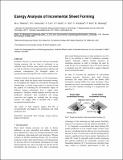Exergy analysis of incremental sheet forming
Author(s)
Dittrich, M. A.; Cao, J.; Roth, J. T.; Xia, Z. C.; Kiridena, V.; Ren, F.; Henning, H.; Gutowski, Timothy G; ... Show more Show less
DownloadGutowski_Exergy analysis.pdf (618.5Kb)
OPEN_ACCESS_POLICY
Open Access Policy
Creative Commons Attribution-Noncommercial-Share Alike
Terms of use
Metadata
Show full item recordAbstract
Research in the last 15 years has led to die-less incremental forming processes that are close to realization in an industrial setup. Whereas many studies have been carried out with the intention of investigating technical abilities and economic consequences, the ecological impact of incremental sheet forming (ISF) has not been studied so far. Using the concept of exergy analysis, two ISF technologies, namely single sided and double sided incremental forming, are investigated and compared to conventional forming and hydroforming. A second exergy analysis is carried out with the purpose of examining the environmental impact of different forming technologies from a supply chain perspective. Therefore, related upstream activities (die set production, aluminum sheet production and energy conversion and supply) are included into the exergy analysis. The entire supply chain is modeled with Matlab/Simulink. The results of both analyses suggest that ISF is environmentally advantageous for prototyping and small production runs.
Date issued
2012-03Department
Massachusetts Institute of Technology. Department of Mechanical Engineering; Massachusetts Institute of Technology. Laboratory for Manufacturing and ProductivityJournal
Product Engineering
Publisher
Springer Science + Business Media B.V.
Citation
Dittrich, M. A. et al. “Exergy Analysis of Incremental Sheet Forming.” Production Engineering 6.2 (2012): 169–177. CrossRef. Web.
Version: Author's final manuscript
ISSN
0944-6524
1863-7353